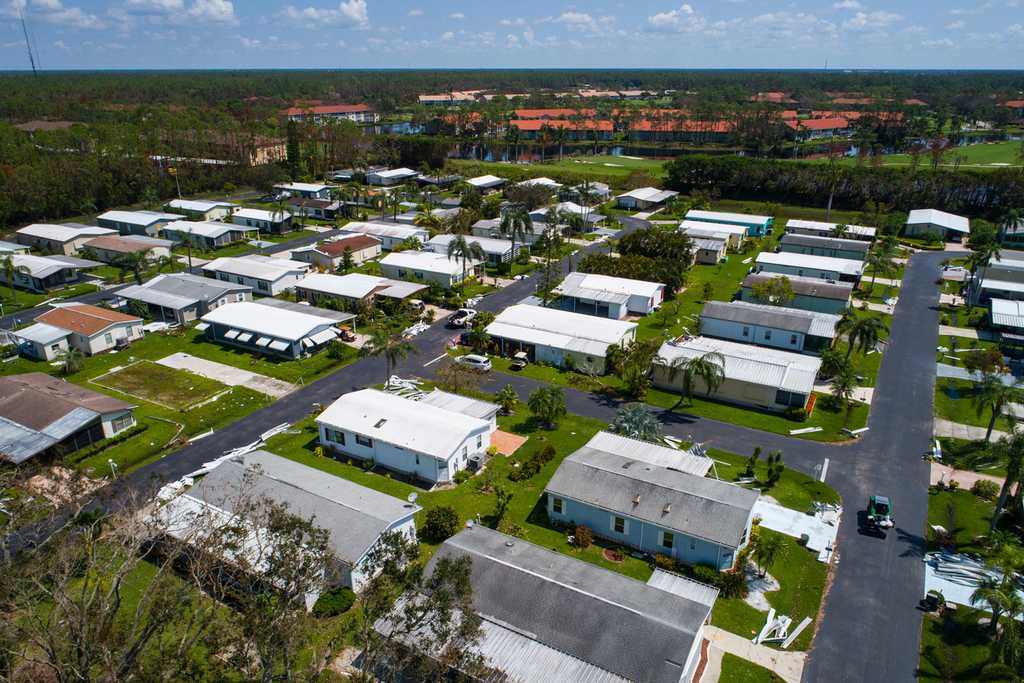According to the Manufactured Housing Institute, 22 million Americans live in mobile homes. If you're one of them, you owe it to yourself to protect your home against damaging fire, severe weather, and other destructive incidents. A mobile home (HO-7) insurance policy provides that protection.
What is mobile home insurance?
Mobile home (HO-7) insurance, also known as modular home insurance or trailer home insurance, provides financial protection if your home is damaged or destroyed. It also helps you replace damaged or stolen personal items and protects you if you’re held liable for someone’s injury or property damage.
Mobile home (HO-7) insurance policies are structured similarly to standard homeowners policies. They’re sold by many of the same companies that offer homeowners insurance.
What mobile home insurance covers
As with a standard homeowners insurance policy, a mobile home policy provides five primary coverages. These coverages are often identified with letters A through E, and include the following:
Coverage A (Dwelling)
This pays to repair or replace the home if it’s damaged by fire, wind, or another catastrophic incident. A mobile home (HO-7) policy provides open peril coverage, meaning it'll pay for most incidents unless specifically excluded in the policy. Standard exclusions include flooding, earthquakes, landslides, and damage due to neglect.
Coverage A is subject to a limit — the maximum amount the insurance company will pay for a claim. You choose the limit when you buy the policy and should base it on the cost to replace the home (your insurance company or agent can help you estimate this).
Coverage B (Other structures)
This pays to repair permanent structures unattached to the main dwelling, such as a shed or fence. As with coverage A, coverage B is provided as open peril coverage on a mobile home (HO-7) policy.
It also has a limit, which is usually a percentage of the coverage A limit. So if your coverage A limit is $125,000, and your coverage B limit is 10% of that, then your insurer will pay up to $12,500 for a coverage B claim.
Coverage C (Personal property)
This pays to repair or replace personal belongings that are damaged or stolen. Coverage C is provided on a named peril basis, meaning it pays only if the loss occurs due to a specific type of incident listed in the policy. Common named perils include fire, smoke, theft, and damage from a falling object. This coverage is subject to a limit.
Coverage D (Additional living expense)
This provides reimbursement for extra costs you incur if you need to move out temporarily while your house is being repaired. Expect coverage E to help you pay for a hotel or apartment rental, restaurant meals, and laundry services. The coverage is subject to a limit.
Coverage E (Liability)
This provides financial protection if you’re held responsible for someone’s injury or property damage. It pays for things such as damages and legal fees, and generally applies to incidents that occur both on and off your property. This coverage is subject to a limit.
What’s not covered by mobile home insurance
A mobile home policy is similar to a standard homeowners insurance policy. As such, there are several types of incidents a policy won’t cover (referred to as “exclusions”). Typically, a policy will exclude coverage for earthquakes or flooding. If you live in an area prone to either of these events, talk to your insurance company or agent about purchasing additional policies to provide these coverages.
A mobile home insurance policy may also exclude incidents resulting from neglected maintenance.
How much mobile home insurance costs
According to insurance brand Trusted Choice, mobile home insurance rates average between $100 and $800 per month. This cost can vary based on many factors, including the value, size, and location of the home; its construction; and how it’s anchored to the ground. It may be challenging to get insurance for a mobile home built before 1976, when federal laws requiring modern construction standards were put in place, but policies are available from some companies.
As with any insurance policy, it pays to shop around. Rates often vary significantly between insurance companies. An independent insurance agent, who represents multiple insurers, can do much of the shopping legwork for you.
FAQ (frequently asked questions)
Do I need insurance on my mobile home?
Mobile home insurance isn’t required by law. However, it may be required by your mobile home community, or by your lender if you finance your home. Beyond this, owning a mobile home represents a significant financial investment. You owe it to yourself to protect that investment with mobile home (HO-7) insurance.
Is insurance on a mobile home expensive?
A mobile home (HO-7) insurance policy costs an average of $100 to $800 per month, according to insurance brand Trusted Choice. It’s a good idea to shop around to see if you can save money. You might find that rates vary significantly between insurance companies.
Can you insure an older mobile home?
Yes, you can insure an older mobile home. However, you may have a more challenging time finding coverage for a mobile home built before 1976, when federal standards for manufacturing and safety went into effect.
To find coverage for an older mobile home, you may need to contact multiple insurance companies. An independent insurance agent, who typically represents several companies, can help.
Can you get flood insurance on a mobile home?
Yes. As with a standard home, flood insurance is available through the National Flood Insurance Program (NFIP).
Can you get mobile home renters insurance?
Yes, mobile home renters insurance is available. A renters policy provides coverage for your personal property, along with liability and additional living expense coverages.
What is the difference between a mobile home and a manufactured home?
The terms "mobile home" and "manufactured home" are often used interchangeably. Technically speaking, a mobile home is any prefabricated home delivered to a property in one piece. If produced after 1976, the home must comply with manufacturing and safety guidelines established by the U.S. Department of Housing and Urban Development (HUD) and is referred to as a manufactured home.
"Modular home" is yet another category. Also prefabricated, a modular home may be delivered to a site in multiple pieces. Unlike a mobile or manufactured home, a modular home must comply with local building codes. As such, a modular home's insurance needs are best met with a standard homeowners (HO-3) policy.
We've used the term "mobile home" for this article and have focused solely on their insurance needs.
What does “HO-7” mean?
"HO-7" is part of a labeling system used by the insurance industry to denote different types of homeowners policies. HO-1, HO-2, HO-3, and HO-5 are for single-family homes, HO-4 is for rented homes, and HO-6 is for condominiums.

